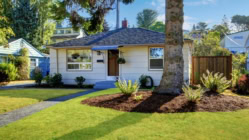
What is a No Down Payment Mortgage?
A no down payment mortgage, also known as a zero-down or 100% financing mortgage, is a loan that allows you to purchase a home without making any upfront payment. Traditionally, many home buyers believe they are required to provide a down payment of around 20% of the home’s purchase price. However, with a no down payment mortgage, you can bypass this requirement and still secure the financing you need.
How to Buy a House with No Down Payment
- Explore Government Programs: One of the best ways to purchase a home with no down payment is by taking advantage of government programs specifically designed for first-time home buyers. Programs like FHA loans, VA loans, and USDA loans offer flexible eligibility criteria and low or no down payment options.
- Seek Assistance from Local Agencies: Many local and state agencies provide down payment assistance programs to help individuals and families achieve homeownership. These programs offer grants, loans, or a combination of both to cover the down payment and closing costs.
- Research Mortgage Lenders: Some mortgage lenders offer specialized loan products that cater to individuals with low income and no down payment. It’s important to chose a mortgage lender who is well experienced in helping homebuyers with little to no down payment. JVM Lending is well versed in all types of loans, like FHA, VA, USDA, and has many resources for down payment assistance programs.
FHA Financing: Making Homeownership Accessible
FHA (Federal Housing Administration) loans are a popular choice for first-time home buyers seeking mortgage financing with a low down payment. These loans are insured by the FHA, which allows lenders to offer more favorable terms and lower down payment requirements.
Requirements for FHA Loans
To qualify for an FHA loan, you must meet certain requirements:
- Minimum Down Payment: FHA loans require a minimum down payment of 3.5% of the purchase price. This is significantly lower than the 20% down payment commonly associated with conventional loans.
- Credit Score: While FHA loans are more flexible when it comes to credit scores, having a higher score can help you secure a better interest rate. Typically, a credit score of 580 or higher is recommended for the 3.5% down payment option. If your credit score falls between 500 and 579, you may still be eligible, but a higher down payment of 10% may be required.
- Debt-to-Income Ratio: FHA loans consider your debt-to-income ratio, which is the percentage of your monthly income that goes towards paying debts. Generally, a debt-to-income ratio of 43% or lower is required, although some exceptions may be made in certain circumstances.
- Property Requirements: The property you intend to purchase must meet certain criteria set by the FHA. This includes being a primary residence, meeting minimum property standards, and adhering to certain safety and security guidelines.
FHA loans provide an accessible option for buyers with a low down payment. The program is not limited to first-time home buyers and offers flexibility in credit requirements, making it an attractive choice for many individuals.
View mortgage rates for
April 26, 2024
VA Loans: Exclusive Benefits for Veterans and Service Members
VA loans are mortgage loans specifically designed for veterans, active-duty service members, and eligible surviving spouses. These loans are guaranteed by the Department of Veterans Affairs, providing exclusive benefits to those who have served our country.
Requirements for VA Loans
VA loans offer several advantages, including no down payment requirement and no private mortgage insurance. To qualify for a VA loan, you must meet the following requirements:
- Eligibility: To be eligible for a VA loan, you must be a veteran, active-duty service member, or meet specific criteria as an eligible surviving spouse. You will need to obtain a Certificate of Eligibility (COE) from the VA to prove your eligibility.
- Minimum Down Payment: VA loans typically do not require a down payment. This is a significant benefit for those who may not have substantial savings for a down payment.
- Credit Score: While the VA does not set a minimum credit score requirement, most lenders will have their own credit score guidelines. Generally, a credit score of 620 or higher is recommended to increase your chances of approval.
- Funding Fee: VA loans require a funding fee, which is a one-time payment based on a percentage of the loan amount. This fee helps offset the costs of the VA loan program. However, veterans with a service-connected disability may be exempt from paying the funding fee.
VA loans offer exclusive benefits to veterans and service members, including competitive interest rates, no down payment, and no private mortgage insurance. If you are a veteran or an active-duty service member, exploring VA loan options can be a great way to achieve homeownership.
USDA Loans: Financing for Rural and Suburban Homebuyers
USDA loans, backed by the United States Department of Agriculture, are designed to promote homeownership in rural and suburban areas. These loans offer attractive terms, including low or no down payment requirements and low-interest rates.
Requirements for USDA Loans
To qualify for a USDA loan, you must meet the following requirements:
- Eligible Property Location: USDA loans are available for properties located in designated rural and suburban areas. These areas are determined by the USDA and are typically outside major metropolitan areas.
- Income Limits: USDA loans have income limits based on the area’s median income. Your household income should not exceed the specified limit to qualify for a USDA loan. These limits vary depending on the size of your household and the location of the property.
- Credit Score: While USDA loans have flexible credit requirements, having a higher credit score can improve your chances of approval. Most lenders prefer a credit score of 640 or higher.
- Property Requirements: The property you intend to purchase with a USDA loan must meet certain criteria, including being in a designated eligible area and meeting specific standards for safety and livability.
USDA loans are an excellent option for home buyers in rural and suburban areas. They provide the opportunity to purchase a home with low or no down payment and often offer competitive interest rates.
Down Payment Assistance Programs: Grants to Help Homebuyers
In addition to the loan programs mentioned above, there are various down payment assistance programs available to help home buyers with their upfront costs. These programs provide grants, loans, or a combination of both to assist buyers in making their down payment.
Down payment assistance programs vary by location and may be offered by local and state housing agencies, nonprofits, or even employers. These programs aim to make homeownership more accessible by reducing the financial burden of a down payment.
Qualifications and requirements for down payment assistance programs can vary widely. Some programs are specifically designed for first-time home buyers, while others may have income limitations or target specific communities or professions.
To find down payment assistance programs in your area, you can research local housing agencies, visit their websites, or speak with a mortgage lender who can guide you through the available options. There are often programs available for first-time homebuyers, so always make a point to ask what might be available to you when speaking with your lender.
Frequently Asked Questions About No Down Payment Mortgages
Q: Can I qualify for a no down payment mortgage as a first-time home buyer?
A: Absolutely! Many mortgage programs with no down payment are specifically designed for first-time home buyers. These programs often have less stringent requirements and provide more flexibility compared to traditional loans.
Q: Are there income limitations for obtaining a no down payment mortgage?
A: Some programs do have income limitations, while others do not. It’s crucial to research the specific requirements of each program you’re interested in to determine if you qualify based on your income.
Q: Will I have to pay private mortgage insurance (PMI) with a no down payment mortgage?
A: In some cases, yes. When you obtain a mortgage with less than 20% down payment, lenders typically require PMI. However, certain loan programs, such as VA loans, do not require PMI regardless of the down payment amount.
Q: Can I still negotiate the purchase price if I’m using a no down payment mortgage?
A: Absolutely! Just like any other home purchase, you can negotiate the purchase price with the seller. Keep in mind that a lower purchase price may also result in a lower loan amount, which could reduce your monthly mortgage payments.
Q: Are there any disadvantages to getting a no down payment mortgage?
A: While no down payment mortgages can be an excellent option for some buyers, it’s essential to consider the potential drawbacks. These may include higher interest rates, stricter qualification criteria, or the need for private mortgage insurance (PMI). Be sure to weigh the pros and cons before making a decision.
Homebuying With No Down Payment
In conclusion, buying a house with no down payment is not only possible but also accessible to individuals with low income or those taking their first steps into homeownership. By exploring government programs, seeking assistance from local agencies, and researching mortgage lenders, you can find the right no down payment mortgage option that fits your needs. Remember to weigh the pros and cons, consider the eligibility criteria, and ask the right questions to make an informed decision.
JVM Lending’s team is here to help make homebuying a reality for all, so chat with us to learn more about how we can help you buy a home.
























